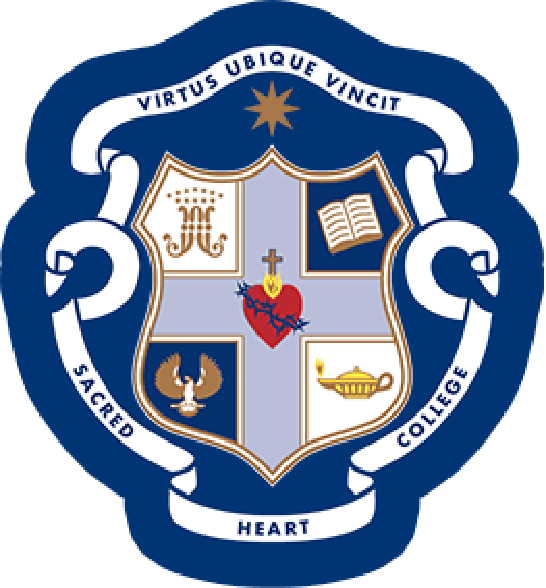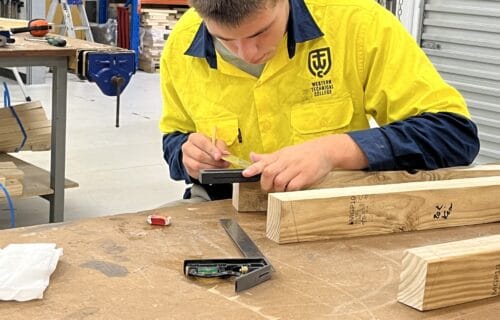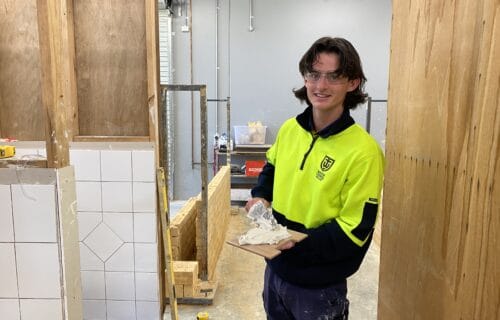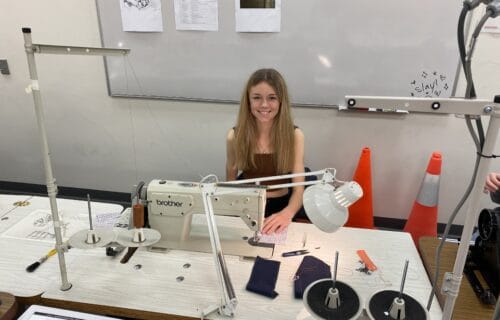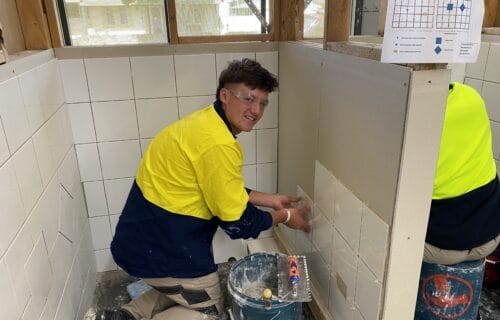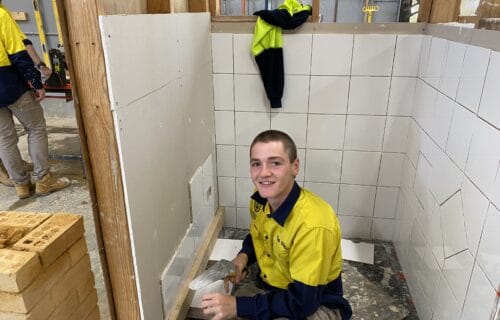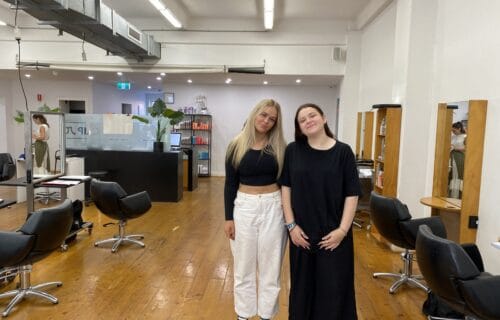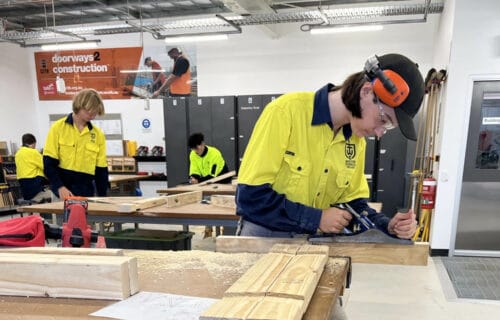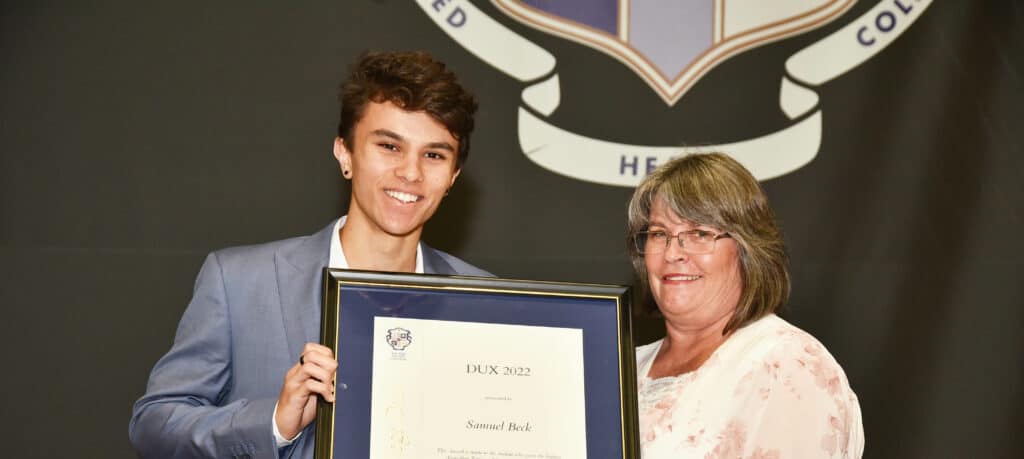
2022 College Dux, Samuel Beck was recognised for his outstanding academic achievements at the Laureate Assembly in February, pictured with Old Scholar and Hall of Honour inductee, Robyn Verrall (SHOC ’82).
To our Sacred Heart College community
Some wise words from 2022 College Dux – Samuel Beck
How did you decide on your study pathway beyond school?
I was indecisive in choosing my course for uni after school. I found exploring future job opportunities and relating each course to my interests an effective way to narrow down my study pathway. Discovering what I was passionate about in school and what I wanted to learn more about was important in choosing my degree.
What do you hope to do once you graduate?
I hope to explore research and development of devices and technologies that will shape the medical, transportation and construction industries. I am passionate about the exploration and application of technologies in various industries and would love to work somewhere in this area of expertise.
If you had to describe Year 12 in three words what would they be?
Three words/terms I would use to describe Year 12 would be dedication, hard work and achievement.
Some words of advice for current students
Discover and focus on what you enjoy in school; do what makes you happy. Have well balanced school and study routines to put yourself in the best place to succeed. Be resilient and focus on your own progress, and take every opportunity to achieve your goals and make the most of your schooling.
Students at work – Adelaide Zoo Career Awareness Day
On Friday 24 March, Year 10 students, Mikayla Lojszczyk and Heather Hunter spent the day at Adelaide Zoo as part of the Career Awareness Day program. This day gives students a chance to learn all about the variety of careers that are needed to keep a zoo running. Students were introduced to guest speakers from animal care, horticulture, marketing and administration, as well as investigating training pathways to animal related careers.
This is what they had to say:
“The zoo day was really fun. The only photos I took were of the animals but I got a really good photo of one of the meerkats and giraffes! This day has definitely made me more interested in having a career at the zoo or a career to do with animals.
We listened to guest speakers from the zoo and they told us how they got into a career at the zoo and the journeys they went on to get there. We also got free time at lunch to walk around the zoo to explore.
At the end of the day we viewed the ‘behind the scenes’ areas where they operate on animals, where unwell animals go and how animals sometimes have to be quarantined, the greenhouse where they grow plants, the fridges and shelves where the animals’ food is kept and where the volunteers make games for the animals by hiding food in paper mache animal friendly creations.” ~ Mikayla Lojszczyk (Year 10).
“They also briefly covered other things such as how a lot of the zoo’s work is in fundraising for conservation and the jobs less concerned with animals. For example, they told us about how architects and engineers were needed to create special habitats and enrichment for the animals, and how media designers become the face of the zoo.
I recommend the course for anyone who is interested in a career with animals as we got a lot of insight about what working in a zoo looks like.” ~ Heather Hunt (Year 10).
Key dates
-
Work Experience for 2023
Before considering Work Experience please be aware of the following:
It is a legal requirement that prior to commencing Work Experience students are inducted in the following areas: Work Health and Safety Act 2012 SA, Children and Young People (Safety) Act 2017 SA, Equal Opportunity Act 1984 SA, Child Safety (Prohibited Persons) Act 2016 SA and Fair Work Act 2009 (Cth).
Adequate time (approximately 5 hours) should be allocated to cover these topics effectively and students need to demonstrate their understanding. This induction is done by the school and is consistent with our Duty of Care to ensure that no student is placed where they may not be safe physically or psychologically.
In addition to this, the Work Experience form must be signed by the student, work placement provider, parent/guardian (all arranged by the student) and finally the principal or delegate (arranged by the school). The original Work Experience Agreement form then becomes a legal contract which sets the school insurance cover in place and must be retained by the school.
The school must also provide a contact person who is responsible for each student for the duration of their placement.
Work Experience is a very valuable opportunity for most students however, it does take time to ensure that the above expectations are met. We are happy to accommodate students in the times allocated. Please do not cause yourself or the College embarrassment by making other arrangements and then asking for exceptions to be made.
Students who wish to do Work Experience during 2023 are advised that the dates are:
10 – 14 July
Deadline for paperwork: 9 June9 – 13 October
Deadline for paperwork: 1 September20 – 24 November (Optional Work Experience Year 12s only)
Deadline for paperwork: 20 October4 – 8 December
Deadline for paperwork: 3 NovemberPlease note this is general Work Experience only. Students undertaking a VET program will need to organise their VET work placement with the VET Office.
-
Career Expos – Save the dates
Adelaide Careers and Employment Expo 2023
Friday 12 – Saturday 13 MaySouth Australia’s largest Careers and Employment Event is open on 12 and 13 May, 2023 at the Adelaide Showground. The Expo will host over 130 organisations and employers with career opportunities for all ages. Entry is free.
The event is for school students, parents, teachers, graduates, job seekers, people looking for courses and workers seeking new training options.
Find out more here.
Sacred Heart College Careers and Pathways Expo
Wednesday 5 July
6.00 – 7.00pm
Br Joseph McAteer Centre, Marcellin Campus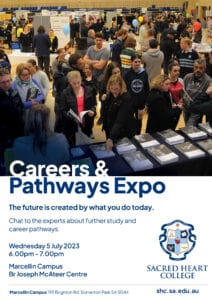
This is a wonderful opportunity for students and parents to meet and discuss career options with experienced educational and industry professionals.
Learn about career paths that you never knew existed.
Flinders Open Days
Friday 11 August (Bedford Park), Saturday 12 August (Bedford Park) and Saturday 19 August (Tonsley) -
ICHM Discovery Day dates for 2023
Thursday 13 April, Wednesday 24 May, Thursday 15 June, Thursday 6 July and Thursday 31 August
Please note ICHM will be at the Sacred Heart College Careers and Pathways Expo on Wednesday 5 July.
ICHM Discovery Days aim to get students thinking differently about their post high school studies and career development, covering a range of exciting topics including international business and tourism, luxury hotel design and hospitality career opportunities.
Who should attend?
Students who are currently in Year 10-12 and are interested in business, hotel management and hospitality industry and want to discover more about a possible career path in a luxury hotel.What time?
9.30am – 2.00pmWhere?
Start at ICHM Campus on 131-139 Currie Street, followed by a tour of a hotel and lunch.What is the cost?
All costs are covered by ICHM except for travel costWhat to wear?
School uniformWhat is included?
– Interactive sessions with ICHM Lecturers
– Tour of Adelaide Hotel
– LunchHow to register?
Visit this link. -
Enter the World of Le Cordon Bleu – Career Residential, Adelaide
19 – 21 April
Please note Le Cordon Bleu will be at the Sacred Heart College Careers and Pathways Expo on Wednesday 5 July.
Le Cordon Bleu are opening their doors to high school students in Years 11 & 12, to experience a ‘day in the life’ at one of the world’s leading culinary and hospitality institutions to provide a taste of what a future career in global hospitality will be like.
Meet lecturers and Le Cordon Bleu professionals, hear from industry experts, discover what Le Cordon Bleu hospitality management degree programmes involve and experience hands-on culinary arts with their chefs.
Find out more here.
-
Create for a day at SAE
15 April – 29 April
Please note SAE Institute will be at the Sacred Heart College Careers and Pathways Expo on Wednesday 5 July.
SAE Institute is opening its doors this April for a one-day program, designed to expand your skills and get you working on inspiring creative projects in the fields of Animation, Audio, Design, Film, Games, Music Production, or Songwriting.
Don’t miss out on your chance to experience life as an SAE student and discover what it means to be a creative professional, in state-of-the-art facilities with industry experts by your side.
During the workshop, attendees will learn valuable practical and collaborative skills to build a creative piece of work! You will also receive a certificate of participation to acknowledge the creative project you have undertaken.
Due to the level of workshop content, this event is open to school students aged 15 years and above (Year 10 and over).
Find out more here.
-
Bond Virtual Open Day
Saturday 29 April
Can’t make it to campus? No problem – Bond University’s Virtual Open Day experience makes it possible to get to know them at the click of a button. Tune into Virtual Open Day at any time and watch as they dive deeper into their faculties, go behind the scenes of student life, and chat with some amazing Bondies in this unmissable snapshot of the Bond University experience.
Find out more here.
-
Torrens University – Vogue Australia 50% Design Scholarship
Opens: Wednesday 1 March
Closes: Monday 22 May
Value: 50% reduction of your course fee.
Further details can be found here.
-
AIE Open Day
Saturday 13 May
Please note AIE Institute will be at the Sacred Heart College Careers and Pathways Expo on Wednesday 5 July.
Discover the courses designed to get you started in game development, 3D animation, film and visual effects at the AIE Open Day on Saturday 13 May 2023. This event will be held at AIE Campuses in Sydney, Melbourne, Canberra and Adelaide from 10am to 3pm.
AIE’s Open Day is a great opportunity to meet teachers, staff and students. The day will cover everything you need to know about the:
- careers in games and VFX that we train students for;
- studios and industries that we work with;
- courses we offer – from beginners to professional mastery, and;
- the software, skills and knowledge we teach.
AIE’s Open Day will also include presentations on entry requirements and how to apply. Find out how AIE can get you into a creative career.
Find out more here.
Vocational Education and Training (VET) update (April 2023)
Visiting students at Training Organisations
VET courses are well underway and I’ve been busy visiting Sacred Heart students at their VET training organisations, which has taken me all over the metropolitan area from Noarlunga and Hallett Cove to Urrbrae, Tonsley, Rosewater and the city. It’s great to see the students in action and enjoying themselves in a different environment working towards their career path.
VET in 2024
If current Year 10 or 11 students are considering a VET Certificate Course in 2024, please check your email and SEQTA notices for VET Taster or Immersion days coming up in Term 2 and 3. It’s a fantastic opportunity to get along to a VET Taster/Immersion Day to find out about the course requirements and pathway options. Attending a Taster Day can be used as pathway preparation which is a requirement to access the government subsidy available for some VET courses.
Sarah Benedictson
VET Coordinator
Tertiary updates
-
Flinders’ newest campus is almost here!
Set in the heart of the city, Flinders at Festival Plaza sits at the epicentre of Adelaide’s most vibrant and connected cultural hub. Opening for students commencing in 2024.
The Festival Plaza is surrounded by key arts, business, sports and government institutions, providing greater connection for student Work Integrated Learning (WIL) placements, as well as education and research partnerships.
Easy access to public transport allows students to explore the city centre and beyond, with connection to Tonsley and Bedford Park campuses via the door-to-door rail link.
Set over eight stories, the campus will host a range of study areas with degrees including:
- Business
- Creative Industries
- Engineering
- Health Sciences
- IT and Computer Science
- Law
- Social Work
- Sport, Health and Physical Activity
- Tourism and Events
View courses offered at the Festival Plaza campus here.
-
New courses in 2023
Each year, universities and other institutes update their courses and often add new ones. So if you’re looking for something new and exciting, or just something a little bit different here are a couple.
Machine Learning at Flinders
By now we’ve probably all heard of ChatGPT and how it’s majorly disrupting both jobs and education around the world. If you want to be at the forefront of Artificial Intelligence advances and create the next best thing, you might like to study this new course at Flinders University. Part of their Bachelor of Information Technology, this degree gives you the knowledge and techniques you need to be at the forefront of the growing machine learning industry around the world.Find out more here.
Digital Business at UniSA
Emerging technologies have revolutionised the way business is done – gone are the days of the brick and mortar store and cash, with online shopping, digital currencies, and more completely changing the face of business. Learn how to maximise business efficiency and take advantage of these opportunities as they arise with UniSA’s new Bachelor of Digital Business.Learn more here.
Training and work
-
Timber and Building Materials Association (TABMA)
Please note TABMA will be at the Sacred Heart College Careers and Pathways Expo on Wednesday 5 July.
TABMA Apprentices and Trainees is the largest timber and forestry Group Training Organisation in Australia.
Steps to a career for life in the Timber Industry
Many people start this journey doing a Certificate III, such as Timber Building Products Supply.This Traineeship teaches you all about timber, where it comes from, who uses it and what the different timber products are used for.
Once completed, you may go on to a Cert IV Business Sales or Cert IV Leadership & Management or move into a detailer/estimator role. Or you may even decide to become more hands on and move into a Carpentry Apprenticeship. The choice is yours!
Maybe you are good with computer design? Starting your career with a Frame and Truss Design Traineeship may begin your journey.
There are literally hundreds of job pathways in the timber industry.
Career Opportunities – TABMA are recruiting – Frame and Truss Manufacturer, CAD Detailer, Merchandising & Retail, Warehouse & Operations, Shopfitter, Cabinetmaker, Administration, Sales and Business Management.
Find out more here.
-
Tourism Apprenticeship and Traineeship spotlight
Tourists spent $96.8 billion in Australia over the 2021-22 financial year – and now that we’re bouncing back from COVID and international travel is once again on the rise, this number is only going to get bigger. If you want to be a part of this booming industry, you might like to look into doing an apprenticeship or traineeship in tourism.
What is a career in tourism?
Tourism is a huge industry, commonly comprising roles in accommodation, hospitality, retail, transport, and even education. You could find yourself leading tour groups, checking in guests at a hotel, driving a tour bus, organising travel itineraries, operating your own souvenir shop, or cooking at a popular restaurant. There are so many different roles and jobs to choose from.What skills do I need for a career in tourism?
A huge part of tourism revolves around people, ensuring they have the best possible experience on their travels. So you’ll need to be a great communicator, as well as patient and kind. The industry can be fast-paced at times too, so being adaptable and organised is also very important.Why should I consider a tourism apprenticeship or traineeship?
Apprenticeships and traineeships are a great way to get your foot in the door with an employer and start building valuable skills. There are often lots of opportunities to continue working with your employer after your apprenticeship or traineeship is complete, and even advance your career down the track.A tourism apprenticeship or traineeship will see you doing real work for an employer while completing study with a TAFE or RTO. A tourism apprenticeship or traineeship can take anywhere between 1-4 years to complete, depending on whether you work and study full or part-time.
Here are some common qualifications you might want to look into:
- Certificate III in Tourism
- Certificate III in Hospitality
- Certificate III in Commercial Cookery
- Certificate IV in Travel and Tourism
There are tons of benefits to an apprenticeship or traineeship, rather than just work or study alone, including:
- Getting paid while you learn – unlike uni, you can work and study without having to take on an insane workload.
- The opportunity to get hands-on experience, not just endless reading.
- The potential to connect with an employer and continue working with them after your apprenticeship or traineeship is finished.
- Your qualification will be nationally recognised, meaning you can go anywhere with it.
Where can I find apprenticeship and traineeship opportunities?
Just like searching for a job, there are lots of places you can go to find an apprenticeship or traineeship. You can start your search on sites like SEEK and Indeed. Take a look on social media like Facebook or LinkedIn to see if any local businesses are hiring. Sign up with an Apprenticeship Network Provider or Group Training Organisation, or even go old fashioned and take a look in the local paper or give local businesses a call.Here are some examples of the kinds of opportunities available at the moment:
- Apprentice Chef, Perth, WA
- School-Based Traineeships with CaPTA, Cairns, QLD
- Trainee Skipper, Melbourne, VIC
- Bus Operator Traineeships, Burwood, NSW
Employment
-
Junior Kitchenhand/Dishie – Good Slice Pizza, Glenelg
Goodslice Pizza at Glenelg are looking for a junior Kitchenhand/Dishie for 5-8hrs per week, mainly Friday and Saturday nights.Ideally you would be kitchen orientated and not afraid of messy manual work.If this sounds like you, please email your resume with contact details through to admin@goodslicepizza.com.au
-
Carpentry Apprenticeship – Henry Construct
Henry Construct are looking for someone that’s interested in a carpentry / building apprenticeship, preferably full time.
If you are interested in this position, please contact Adam Robertson at info@henryconstruct.com.au
Mobile: 0432 440 510 -
Bricklaying Apprenticeship
Old Scholar Alex Channing runs his own bricklaying business and is looking for anyone interested in an apprenticeship in bricklaying.
Ideally this is a full time position, but he may consider school based.
If you would like more information please contact Alex on 0418 845 879.
-
Team members – Lord of the Fries (Glenelg, and Hindley Street)
Are you friendly?
Are you a fry lover?
Are you willing to learn?Lord of the Fries are looking for team members who can work at stores in Hindley Street and Glenelg.
Shifts are available after school, weekend and during the school holidays.
You will be taking orders, handling cash, serving food, cleaning and having a great time doing it!
Lord of the Fries offers competitive rates and a very positive work environment with training provided. No experience necessary. To start ASAP.
Apply at your local store here.
Spotlight on careers
-
‘A day in the life’ videos
Watch snapshots at the links below of a typical day in different careers, or interviews with people in the job about what they do and how they started their careers.
-
How to become an Air Traffic Controller (ATC)
Responsible for keeping aircraft, flight crews, and airline passengers safe, Air Traffic Controllers work from control towers, approach control facilities, or route centres.
They instruct aircraft when to safely take off or land and coordinate air traffic patterns to maintain safe distances from other aircraft. They also monitor all aircraft to ensure they are in the right place at the right time, problem free. They are authorised to change flight paths if necessary.
Incredibly focused and able to concentrate for long periods? A quick thinker and great team player? Looking for a career that could take you anywhere in the world? Then consider a career in Air Traffic Control.
About you:
- Excellent decision maker
- Good spatial awareness and strong mathematical skills
- Work well under pressure
- Exceptional computer skills
- Confident, highly responsible and motivated
- Fluent English speaker
- Excellent communication skills
- Good forward planning but adaptable to changing situations
- Willing to do shift work 24/7, 365 days of the year.
The job:
- Issue landing and take-off instructions to pilots
- Monitor and direct the movement of aircraft on the ground and in the air, using radar, computers, or visual references
- Organise flight plans and traffic management plans
- Control all ground traffic at airports, including baggage vehicles and airport workers
- Communicate with pilots, airport staff, and other agencies as required
- Provide information to pilots, such as weather updates, runway closures, and flight path changes or directions to emergency landing fields for pilots travelling in bad weather or in emergency situations
- Alert airport response staff in the event of an emergency
- Maintain accurate records and reports.
Lifestyle Impact: High
- Part time opportunities: Low – only around 12% of Air Traffic Controllers work part-time (source: labourmarketinsights.gov.au).
- Average hours for full-time workers: 40 hours a week, which is around average (source: labourmarketinsights.gov.au).
- Air Traffic Controllers’ salary (median) $123,000* per year (source: ato.gov.au). *Salaries greatly vary depending on your skills and experience. If you train through the ADF, you will earn $80,857 as soon as you finish your training (source: defencejobs.gov.au).
- Future career growth: Very strong (source: labourmarketinsights.gov.au).
- You will be doing most of your work indoors, from an air traffic control tower.
- You will need to do a lot of shift work, and be prepared to work any time of the day or night.
Air Traffic Controllers are most in demand in these locations:
Demand for Air Traffic Controllers is highest in Queensland and the Northern Territory, and many Air Traffic Controllers live and work in capital cities (around 70%). Most Air Traffic Controllers work in the Transport, Postal and Warehousing industry.How to become an Air Traffic Controller in Australia
There are two pathways to becoming an Air Traffic Controller in Australia: either complete a traineeship through Airservices Australia, or complete training through the Australian Defence Force.Step 1 – Complete Year 12 with a focus on English and Maths.
Step 2 – Complete a Diploma of Aviation (Air Traffic Control) with Airservices Australia. The course will take 12 months if you go down the Tower path, or 14 months if you go down the Enroute path.
Step 3 – Alternatively, you can complete your training with the Royal Australian Air Force (RAAF), which can take around 12 to 18 months.
Step 4 – Pass an aviation medical and meet security clearance requirements.
Step 5 – Start working as a fully qualified Air Traffic Controller.
Find out more at the links below:
https://www.airservicesaustralia.com/
https://www.defencejobs.gov.au/
Similar Careers to Air Traffic Controller:
- Pilot
- Aircraft Engineer
- Astronaut
- Engineer
- Cyber Security Specialist
- Defence Force.
-
How to become a Graphic Designer
Graphic Designers are professionals who design and create images, typography, animations, and other forms of visual work for all types of media, from print to television.
Artistic and creative with a large splash of computer skills? If that describes you, then there’s a good chance a career as a Graphic Designer would suit you.
About you:
- Creative and innovative
- A whiz with technology
- Great time management
- Excellent communication skills
- Knowledge of typography
- Attention to detail.
The job:
- Meet with clients or art directors to understand project requirements, scope, and budget
- Advise strategies for targeting audiences
- Determine the message to be conveyed
- Design the images that convey the message or develop graphics for illustrations, websites, and logos
- Choose branding – font, colour palette, images, layout, etc.
- Present the project to the client/director
- Make edits if required
- Publish the work to a quality determined by the project.
Lifestyle Impact: Low
- Part Time opportunities: Moderate – around 32% of Graphic Designers work part-time (source: labourmarketinsights.gov.au).
- Average hours for full-time workers: 42 hours a week, which is average (source: labourmarketinsights.gov.au).
- Graphic Designers’ salary (median) $58,200* per year (source: ato.gov.au). *Salaries can vary depending on your skills and experience.
- Future career growth: Very strong (source: labourmarketinsights.gov.au).
- You will be doing most of your work indoors, using computers and other technology.
Graphic Designers are most in demand in these locations:
Many Graphic Designers work in metropolitan areas and capital cities, but using technology means there is also the possibility to work remotely or from home anywhere in the world. Most Graphic Designers work in the Professional, Scientific and Technical Services industry.
Interesting stuff
-
How to ask your teachers for help if you’re falling behind
Falling behind in class or feeling like you’re not understanding something can be upsetting, and sometimes overwhelming. And the thought of needing to ask your teachers for help can be even more stressful on top of that.
But don’t fear – your teachers are there to help you out. You shouldn’t feel guilty about asking for help, but there are some things you can do to make sure you get the most out of it.
Here’s what to do and how to ask your teachers for help.
Be specific
Instead of just giving up and saying “this subject is too hard” or “I just don’t get it”, it’s much more constructive (for both you and your teacher) if you can pinpoint the areas you need help with the most.Take a look back at your work and try to find the specifics on what you’re struggling with. For example, you might be able to remember a mathematical formula off by heart, but struggle when it comes to complex problem solving. Maybe you have a great idea for a short story, but can’t quite get the grammar right.
If you have examples of things you didn’t get right on tests or assignments, bring those in so you can ask what went wrong.
Be proactive
To get the most out of the help from your teacher, it’s best to ask as soon as you realise you’re struggling – leaving it until you’ve gotten a bad mark on your assignment isn’t a great idea.The more time you have to work through an issue, the more likely it is you’ll be able to sort it out, instead of adding extra pressure on already stressful deadlines and due dates.
Be respectful
Generally in life, people will be more receptive to helping you if you treat them with kindness and respect. Try to approach your teacher at an appropriate time (i.e. not while they’re rushing between classes) and be polite.If your teacher has marked you down or given you a bad grade for reasons you don’t agree with, approach the situation with a cool head. Being upset and arguing about it is unlikely to help you – asking questions and taking feedback is much more helpful.
Be flexible
You should always feel that you can ask your teachers for help but there are other people you might be able to approach instead. This could be a good friend, a sibling, a parent, or even help from an external teacher/tutor. The library has teachers available for help each Tuesday, Wednesday and Thursday until 5.00 pm. Just remember the second point – the earlier you ask the better! -
Five things to think about when looking for a course
Planning on going to university or TAFE in the future? You might be feeling a bit overwhelmed by the thousands of course choices out there. If you’re looking for some guidance, we’ve got some things you might like to think about when looking for a course – it could help you make your decision.
Study location
This is one of the most important things you’ll need to consider first. Would you be willing to move to another city (or even state) to study your chosen course? Or perhaps you’re unable (or unwilling) to move and you’d like to study online instead.As well as location, look at different universities or TAFEs and compare your options. Take a tour of the campus (in person or virtually), browse accommodation options, and read about on-campus clubs, facilities, and activities. See if you can read student reviews about their experience at the uni or TAFE, or talk to someone you know who has studied there in the past.
Flexibility and access
As well as where you’ll be studying, take a look at other important details about the course. This includes things like whether part-time study is available, if the uni or TAFE will let you defer your studies, and even what their study calendar is like (when will you be on holidays, for example?).You should also do a bit of research on the institution’s other options and services, such as how easy it is to switch between courses if you’ve changed your mind, whether you’ll receive any credit for past studies, and what kind of support they offer (e.g. for students with disabilities, career advice, etc.).
Entry requirements
One of the key things you’ll need to know about a course is whether or not you’re eligible to apply. So make sure you read and meet any ATAR requirements and have the needed subject prerequisites before you apply. If you’re not eligible through the standard pathway, take a look at the university or TAFE’s alternative pathway options and see if there is another way you might be able to receive an offer instead.Course fees
Unfortunately not a lot of things in life are free – and this includes most tertiary courses. Take a look at not only how much the course will cost, but what your options for payment are. If you’re a domestic uni student, you’ll probably be able to access a HELP loan to cover course fees. Lots of TAFEs and RTOs will provide payment plans for their courses too, and in some cases you can apply for a VET Student Loan. But in some circumstances you might be expected to pay your course fees upfront, so make sure you know exactly what you’ll owe and how you’ll pay for it before signing up.Career pathways
If you’re looking into further study, it’s probably because it will eventually lead you to your chosen job or career. So make sure the course you’re looking at will actually qualify you for future jobs. Take a look at job sites and see what qualifications employers are looking for in roles you’d like to have one day. In some cases, you might be required to have a specific degree to start in your chosen career (if you want to be a doctor, for example, you’ll need to follow a set study pathway).Also consider other jobs and pathways the course could take you, in case you find your career goals change over time or don’t pan out how you expected.
-
How do you know how much you should be paid?
So you’ve got your first job – exciting! One of the best parts of work is having your own money to do with as you please. Of course, we want to believe that employers will do the right thing and follow the rules, and trust that they will pay you the right amount. But if you have some concerns, or are just curious to know, how can you find out how much you should be paid?
How much should you be paid?
The easiest way to find out how much you should be paid is to take a look at the Fair Work Ombudsman’s Pay Calculator. They calculate your pay by using the award for your industry.Awards are defined by Fair Work as “legal documents that outline the minimum pay rates and conditions of employment. They apply to employers and employees depending on the industry they work in and the type of job worked.”
-
The three must have enterprise skills for school leavers
It’s no surprise that today’s world of work is drastically different to only a few years ago. Rampant technology changes, work-from-home, flat management structures, AI, start-ups, online university, and the ‘gig economy’.
Because of this, students need to be equipped with flexibility and an open mind to trying new things, so that they can approach the world of work without the same rigidity that we did years ago.
Which three enterprise skills are most important?
There’s a huge range of skills that students need (enterprise skills comprise more than 25 distinct skill sets like leadership, negotiation, etc.), but if students have these three enterprise skills, they’ll have the ability to take advantage of opportunities that present themselves in the world of work:Interpersonal skills
No matter how technological we get, life and business still require interpersonal skills. It doesn’t matter if students are literally ‘staring at a screen’ all day long, they still need to interact with other people, even if it’s simply typed or spoken communication while working remotely.Employers need to have employees that they can converse with about tasks, and young entrepreneurs/self-employed people need to be able to work with a wide range of people, from suppliers to contractors to customers.
Adding to this, we also need collaboration skills – another key enterprise trait, as our ability to work together is critical to us as a society. If you can relate to people, converse well with people, and collaborate with people, you’ll easily stand out from a wide field of candidates.
Problem solving
As we shift away from needing people with degrees or experience, to valuing people with know-how or the ability to get things done, problem solving is even more important than ever before. Ask almost any employer and they’ll tell you that they’re far more likely to employ someone who can quickly learn how to do something, or solve a problem fast, over someone who has ‘experience’. This is especially so in the technology industries – as rapid solutions to problems (which this skill focuses on) is becoming far more valuable than tenure or degrees.Problem solving as a skill also ties in the need for creativity and critical thinking, both of which can make an individual highly valuable to an employer. Do you want to hire someone who you need to do the thinking for; or someone who can spot a problem, and come up with a solution you hadn’t even considered? It’s not hard to see which employee would be a better choice.
Time management
Yes, there are hundreds of ‘productivity’ apps, reminders, calendars, task-management tools, hacks, tricks and more. But without the ability for a young employee to manage what tasks are a priority and then manage their own process of doing them on time, schedules blow out and employers miss their productivity goals (even the small ones like getting a marketing project finished this week).The ability for a young person to self-manage might seem like a minor thing, but in a workplace where tasks or projects need to be done to meet a schedule, it will very quickly show up as being a major problem. It starts in school with getting ready on time in the mornings, and doing homework/assignments on time, but in the world of work it means deadlines that can cost a business a significant amount of money or missed opportunity if things aren’t done when they should be.
So while this might seem like the simplest of the 3 enterprise skills, being able to manage how and when tasks get done is the foundation of everything else.
There are so many enterprise skills that can make a young employee highly sought after (and a young entrepreneur successful), but starting with the ability to work with people, to be valuable by solving problems, and getting everything done efficiently is a great start.
-
International Women’s Day – Equity and the pay gap
(taken from Study Work Grow – 6 March, 2023)
We celebrated International Women’s Day on the 8 March, with the theme of embracing equity.
The goal of this theme is to encourage people to think about why equal opportunities aren’t enough – people start from different places, so true inclusion and belonging require equitable action. To put it more simply, we need to recognise the difference between equality and equity. Marin Health and Human Services explains it like this:
“Equality means each individual or group of people is given the same resources or opportunities. Equity recognizes that each person has different circumstances and allocates the exact resources and opportunities needed to reach an equal outcome.”
Another relevant topic is: the gender pay gap.
What is the gender pay gap?
The Australian Government’s Workplace Gender Equality Agency defines the gender pay gap as “a measure of how we value the contribution of men and women in the workforce. Expressed as a percentage or a dollar figure it shows the difference between the average earnings of women and men.”It’s important to note that this isn’t the same as equal pay. It’s true that women and men are paid the same for performing the same role. What the pay gap refers to is the difference in average pay between men and women on a wider scale, and the factors that cause this to happen.
So why is there a gender pay gap?
There are lots of things that cause the gender pay gap. Here are just some of them:- discrimination in hiring decisions, both unconscious and intentional
- the fact that women are more expected than men to take time off to care for children
- a lack of workplace flexibility to accommodate caring responsibilities (this one affects men too!)
- female-dominated industries commonly having lower wages (such as healthcare and education)
- the fact that there are less women in management and leadership positions.
The main factors are summed up nicely in this video by the WGEA.
Examples of the gender pay gap
We’ve gone and actually found some data to show that the pay gap is definitely real in Australia. We looked at data from the ATO on particular occupations, both male- and female-dominated, and compared the average salary of both men and women in these occupations. Take a look at the table below.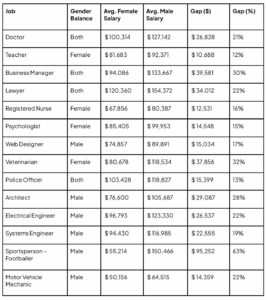
Interestingly, we can see confirmation that even in jobs where there is a significantly higher proportion of women, men still have a higher average salary.
So what can we do about it?
Let’s go all the way back to our original topic – equity.From this information, it’s easy to see that focusing on equality in opportunity doesn’t result in equitable outcomes. Instead, we need to acknowledge and work on the social and economic factors causing this inequity in the first place.
This means employers could be encouraging more men to take time off work to care for children (and part of this includes providing equal access to parental leave for men). It means breaking down barriers around gender expectations and discrimination. It means supporting the women in our lives in all different ways, whether it’s about work, education, or health.
The goal of equity is to change systemic and structural barriers that get in the way of people’s ability to thrive – and at the end of the day, that benefits us all.
Disclaimer: Statements on careers and courses included in this newsletter are not necessarily those of Sacred Heart College. i.e. The text of notices on courses and industry prospects may be taken directly from their correspondence/publicity material. Some material taken from Study Work Grow (South Australia Careers News).


